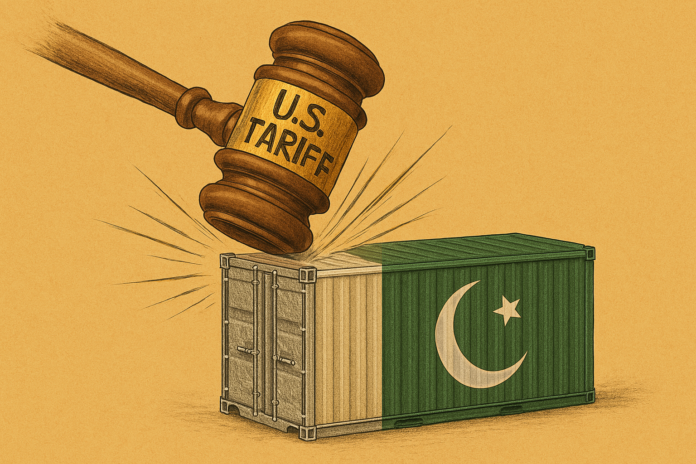The Pakistan Institute of Development Economics (PIDE) has issued a stern warning regarding the potential impact of increased trade tariffs on Pakistani products, recently announced by US President Donald Trump. While the tariffs have been temporarily suspended, the think tank cautioned that their long-term implementation could severely affect Pakistan’s export sector and lead to broader economic instability.
In a policy note titled “Impact of Unilateral Tariff Increase by United States on Pakistani Exports,” the institute highlighted that the proposed 29% reciprocal tariff would add to the existing 8.6% Most Favoured Nation (MFN) tariff, potentially raising the total duty to 37.6%. Such an increase could result in a 20-25% decline in exports to the United States, with a projected loss of $1.1-$1.4 billion annually. The textile sector, which already faces high tariffs, would be particularly hard hit.
Pakistan’s textile exports, a significant portion of the $5.3 billion worth of goods exported to the United States in fiscal year 2024, would lose their price competitiveness in the face of higher tariffs. This could give an edge to regional competitors like India and Bangladesh.
The PIDE analysis also warned that major exporters such as Nishat Mills and Interloop could face production cuts, putting over 500,000 jobs at risk. Other non-textile sectors like leather, rice, and sports goods could also face increased vulnerability.
Despite these challenges, PIDE sees an opportunity for Pakistan to recalibrate its export strategy. The report called for urgent diplomatic engagement with the United States to highlight the mutual costs of the tariffs and preserve trade relations.
PIDE suggested that Pakistan might consider reducing tariffs on select US imports, such as machinery and petroleum, to create room for negotiations. Additionally, increasing the use of US-origin inputs like cotton could help sustain value chains and potentially secure tariff exemptions.
PIDE stressed the need for Pakistan to diversify its exports and markets. Emerging destinations in the European Union, China, ASEAN nations, Africa, and the Middle East could offer growth potential in sectors like IT, halal food, processed foods, and sports goods.
The report also emphasized the importance of reducing energy and logistics costs, simplifying regulations, and fostering innovation in Pakistan’s export sector.
On the international front, the think tank noted that the proposed US tariffs exceed the World Trade Organisation’s (WTO) bound tariff ceiling of 3.4%, raising the possibility of violating multilateral trade rules. While legal recourse through the WTO remains an option, PIDE acknowledged that Pakistan’s fiscal constraints could limit its ability to pursue such actions.
The report concluded by stressing that the tariffs, if fully implemented, could disrupt the US-Pakistan textile supply chain, where American cotton is used by Pakistani mills to produce garments for the US market. This interconnected trade system, it argued, serves the interests of both countries, and disrupting it would yield negative outcomes for all parties involved.
Despite the challenges posed by these tariffs, PIDE believes that with timely diplomacy, strategic reforms, and a focus on diversification, Pakistan can emerge more competitive and resilient in the global economy.




